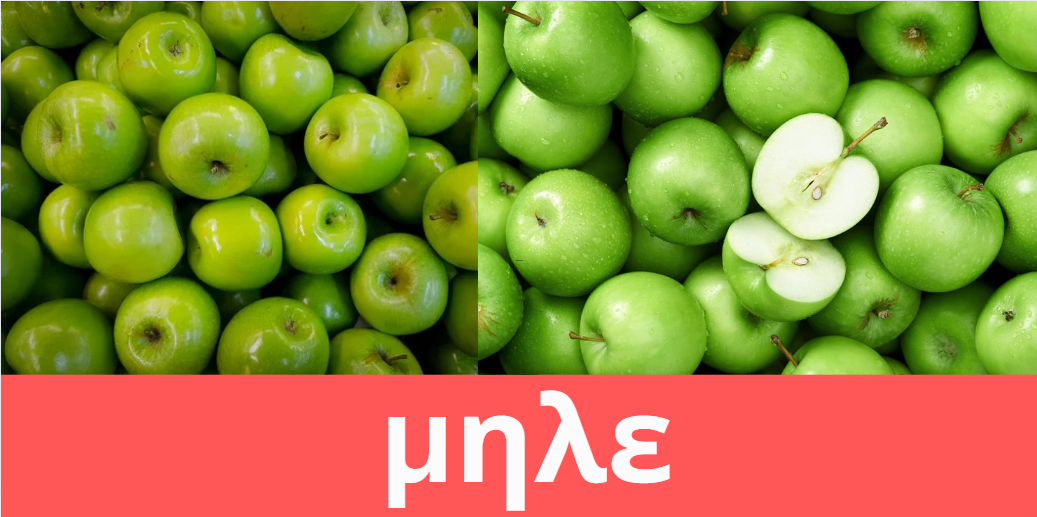Μηλε: A Deep Dive into the Cultural, Historical, and Symbolic Significance of the Greek Apple
Contents
Introduction to Μηλε
The word “μηλε” (pronounced “mee-leh”) is the Greek term for apple, a fruit that has held significant cultural, historical, and symbolic importance throughout the centuries. In Greece, the apple is not just a fruit; it is a symbol woven into the fabric of mythology, literature, and daily life.
From the ancient tales of the Golden Apples of the Hesperides to its modern-day presence in Greek cuisine and traditions, the apple, or “μηλε,” carries meanings and values that transcend its simple appearance. This article explores the multifaceted world of “μηλε,” delving into its history, cultural significance, and the many ways it continues to influence Greek life and beyond.
The Historical Significance of Μηλε
Ancient Greek Mythology and the Apple
The apple plays a prominent role in several Greek myths, each adding layers of meaning to the fruit. One of the most famous myths involving apples is the story of the Golden Apples of the Hesperides. These apples, said to grant immortality, were kept in a garden at the edge of the world, guarded by the Hesperides and a fearsome dragon. Heracles, as part of his Twelve Labors, was tasked with stealing these apples, a feat that required cunning and strength.
Another myth where the apple features prominently is the Judgment of Paris. The goddess Eris, not invited to a wedding, threw a golden apple inscribed with “to the fairest” among the goddesses. This apple sparked a rivalry between Hera, Athena, and Aphrodite, ultimately leading to the Trojan War when Paris awarded the apple to Aphrodite in exchange for the love of Helen.
Apples in Ancient Greek Rituals and Symbolism
In ancient Greece, apples were also associated with love and marriage. A common wedding tradition involved the groom tossing an apple to the bride. If she caught it, it symbolized her acceptance of his proposal. This practice highlighted the apple’s association with love, fertility, and the beginning of a new life together.
The apple was also connected to the goddess Aphrodite, the deity of love, beauty, and desire. In some rituals, apples were offered to her as a symbol of love and beauty, reinforcing the fruit’s romantic connotations.
Μηλε in Ancient Greek Medicine
Hippocrates, the father of medicine, also recognized the health benefits of apples. Ancient Greek medicine often utilized apples in remedies and treatments. Apples were believed to have various health benefits, including aiding digestion and providing essential nutrients. The phrase “an apple a day keeps the doctor away” may have roots in these early medicinal practices, demonstrating the fruit’s longstanding association with health and well-being.
Μηλε in Greek Culture and Traditions
Apples in Greek Cuisine
In modern Greece, apples continue to be a staple in the diet, appearing in various traditional dishes. One such dish is “milopita,” a Greek apple pie that is a beloved dessert across the country. Made with layers of apples, cinnamon, and phyllo dough, milopita is a delicious example of how “μηλε” is celebrated in Greek cuisine.
Apples are also used in salads, often paired with walnuts, honey, and yogurt, reflecting the simple yet flavorful combinations that define Greek cooking. The use of apples in these dishes not only adds a sweet, crisp element but also connects modern culinary practices to the fruit’s rich cultural heritage.
Apples in Greek Festivals and Celebrations
Apples are often present in Greek festivals and celebrations, particularly those that mark the harvest season. The apple harvest is a significant event in rural Greece, where communities come together to collect and celebrate the fruit. Festivals often include traditional music, dancing, and the sharing of apple-based dishes, reinforcing the fruit’s role as a symbol of abundance and community.
Μηλε as a Symbol of Greek Identity
The apple has become a symbol of Greek identity, representing the country’s agricultural roots and the deep connection between the land and its people. In regions known for apple cultivation, such as the Pelion Peninsula, apples are a source of pride and a key part of the local economy. The image of the apple, or “μηλε,” evokes a sense of tradition, continuity, and the enduring relationship between the Greeks and their natural environment.
The Apple in Global Culture and Symbolism
The Apple as a Universal Symbol
While “μηλε” is rooted in Greek culture, the apple is also a universal symbol with meanings that resonate across different cultures and religions. In Christianity, the apple is often depicted as the forbidden fruit in the Garden of Eden, representing knowledge, temptation, and the fall of man. This interpretation has influenced Western art and literature for centuries, making the apple a powerful symbol of human experience.
In other cultures, the apple represents health, prosperity, and good fortune. For example, in Chinese culture, the word for apple (苹果, píngguǒ) sounds similar to the word for peace (平, píng), making the fruit a popular gift symbolizing harmony and safety.
Comparative Analysis: Μηλε and Its Global Counterparts
Comparing the Greek “μηλε” to its counterparts in other cultures reveals both unique and shared meanings. In Greek mythology, the apple often symbolizes love, beauty, and immortality, reflecting the values and beliefs of ancient Greek society. In contrast, in Norse mythology, apples are associated with eternal youth, with the goddess Iðunn guarding the apples that keep the gods immortal.
These different interpretations show how a simple fruit like the apple can carry a multitude of meanings, each shaped by the cultural, religious, and historical contexts in which it is found. The Greek “μηλε” thus stands as both a distinct symbol within its own culture and a part of a broader, global tapestry of symbolism.
The Role of Μηλε in Modern Greece
Economic Importance of Apple Cultivation
In contemporary Greece, apple cultivation is an important agricultural activity, particularly in regions like Thessaly, Macedonia, and the Pelion Peninsula. Greek apples are known for their quality and are exported to various countries, contributing to the national economy.
The cultivation of apples also supports local economies, providing jobs and sustaining communities. The apple harvest season is a time of both hard work and celebration, as farmers gather the fruits of their labor and prepare them for market.
Apples in Greek Art and Literature
The apple continues to inspire Greek artists and writers, who often use the fruit as a symbol in their work. In literature, the apple may appear as a metaphor for temptation, beauty, or knowledge, echoing the themes found in ancient myths. In visual art, the apple is a common motif, representing nature’s bounty and the simplicity of rural life.
Modern Greek poetry and prose often reflect on the apple as a symbol of memory and nostalgia, evoking the landscapes and traditions of the past. Through these artistic expressions, “μηλε” remains a vibrant part of Greece’s cultural landscape.
Health Benefits of Apples in Greek Diet
The health benefits of apples are well-known and widely acknowledged in Greece. Apples are rich in vitamins, fiber, and antioxidants, making them a healthy choice for snacking or as part of a balanced diet. In Greek homes, apples are often enjoyed fresh, but they are also preserved in various ways, such as in compotes, jams, and dried forms.
The Mediterranean diet, which is recognized for its health benefits, often includes apples as a source of natural sweetness and essential nutrients. This diet emphasizes whole foods, fruits, and vegetables, with the apple playing a key role in maintaining overall health and well-being.
The Future of Μηλε: Sustainability and Innovation
Sustainable Apple Farming in Greece
As concerns about environmental sustainability grow, Greek apple farmers are increasingly adopting practices that minimize their ecological footprint. Organic farming, integrated pest management, and water conservation techniques are becoming more common, helping to protect the environment while ensuring the long-term viability of apple cultivation.
These sustainable practices not only benefit the environment but also enhance the quality of the apples, making them more attractive to health-conscious consumers both in Greece and abroad. By prioritizing sustainability, Greek apple farmers are positioning themselves to meet the demands of a changing world.
Innovation in Apple Products
In addition to traditional uses, innovation in apple products is opening new markets for Greek apples. From apple-based beverages like ciders and juices to health-focused products like apple vinegar and dried apple snacks, there is a growing interest in creating value-added products that appeal to a diverse range of consumers.
These innovations reflect a broader trend towards using local, natural ingredients in new and creative ways. By leveraging the unique qualities of Greek apples, producers can create products that stand out in a competitive global market.
The Role of Μηλε in Future Greek Culture
As Greece continues to navigate the challenges and opportunities of the 21st century, the apple, or “μηλε,” is likely to remain a significant cultural and economic symbol. Whether through its role in agriculture, its presence in art and literature, or its continued association with health and wellness, the apple will continue to shape the identity and values of Greek society.
As the world becomes more interconnected, the story of “μηλε” may also reach new audiences, inviting people from around the globe to discover the rich history and cultural significance of this simple yet profound fruit.
Conclusion: Embracing the Legacy of Μηλε
The word “μηλε” may simply mean “apple” in Greek, but its significance goes far beyond that. From ancient mythology to modern-day cuisine, the apple has been a constant presence in Greek culture, symbolizing everything from love and beauty to health and prosperity. As we look to the future, the legacy of “μηλε” will continue to evolve, reflecting the enduring connection between the Greek people and the natural world.
Whether you’re exploring the myths of ancient Greece, savoring a slice of milopita
, or enjoying the health benefits of this versatile fruit, “μηλε” invites you to discover a world rich with history, culture, and endless possibilities. This simple fruit, with its deep roots in Greek tradition, continues to inspire and nourish, both literally and metaphorically, across generations.
FAQs
1. What does “μηλε” mean in Greek?
“Μηλε” is the Greek word for apple, a fruit with significant cultural, historical, and symbolic importance in Greece.
2. What role does the apple play in Greek mythology?
In Greek mythology, the apple appears in several important myths, including the story of the Golden Apples of the Hesperides and the Judgment of Paris. These myths often associate the apple with immortality, love, and beauty.
3. How are apples used in Greek cuisine?
Apples are used in various traditional Greek dishes, including milopita (apple pie) and salads. They are also enjoyed fresh, dried, or preserved in jams and compotes.
4. What is the significance of apples in Greek weddings?
In ancient Greece, apples were often used in wedding traditions as a symbol of love and fertility. The groom would toss an apple to the bride, and if she caught it, it symbolized her acceptance of his proposal.
5. How does apple farming impact the Greek economy?
Apple farming is an important agricultural activity in Greece, contributing to both local economies and national exports. Sustainable farming practices are increasingly being adopted to ensure the long-term viability of apple cultivation.
6. What are the health benefits of apples in the Greek diet?
Apples are rich in vitamins, fiber, and antioxidants, making them a healthy addition to the Greek diet. They are a key component of the Mediterranean diet, known for promoting overall health and well-being.

